
RJD MP Manoj Kumar Jha.
Credit: PTI Photo
The nation is still in shock after the April 22 terror attack in Pahalgam, where tourists were massacred in a terror act calculated to sow communal hatred. In the attackers’ design, we see a clear intent — to turn us against each other, and exploit a tragedy to polarise our society.
Yet, spontaneously, Indians of every faith spoke in a single voice of condemnation. Their example shows that the promise of national unity is not a slogan — it is an instinctive ethic that surfaces whenever extremists, foreign or domestic, attempt to divide us.
Nevertheless, tensions, misunderstandings, and divisions have cast shadows over the spirit of unity that has long been India’s strength. Yet the government headed by Prime Minister Narendra Modi must not lose sight of who we are. India is not merely a land defined by its borders; it is a living mosaic of languages, cultures, religions, and dreams.
From the first hours of Independence, Prime Minister Jawaharlal Nehru insisted that diversity and secularism were essential to a modern, democratic, and unified India. Scarred by Partition, Nehru argued — and rightly so — that majoritarianism would reduce India to a pale mirror of Pakistan, and imperil the young Republic.
It was in that spirit that our Constitution guaranteed freedom of religion, proclaimed equality before the law, and the Preamble enshrined liberty, fraternity, and justice for all Indians. These commitments were strategic as well as moral. A Republic of many people can survive only if the State remains respectfully equidistant from every faith and resolute against every form of bigotry.
Against this yardstick, recent trends are alarming. The Narendra Modi government has chosen — laudably — to send parliamentary and cultural delegations abroad to ‘showcase India to the world’. But what idea of India are we exporting?
In 1947, Sarvepalli Radhakrishnan spoke at UNESCO of a civilisation that “welcomes every faith.” In 1972, Indira Gandhi placed India at the forefront of environmental diplomacy at the Stockholm Summit. Prime Minister Atal Bihari Vajpayee’s 1998 UN General Assembly address, in Hindi, drew applause for its inclusive vision. Members from across the aisle in Parliament have commanded global respect because of the plural heritage of our anti-colonial struggle. If the current emissaries carry abroad a message tinged with sectarian triumphalism, our soft power will wither — no matter how many delegations we dispatch.
At home, the contrast between rhetoric and reality grows starker. Ali Khan Mahmudabad of Ashoka University was arrested for a social-media post that asked us to think, and harm or hurt none. The swiftness of police action has been matched only by the zeal with which partisan voices have painted his very being as suspect. This is an undeniable signal to every minority Indian that dissent is a privilege of the majority, and a crime for the rest. When legacy itself is treated as guilt, we barter away the moral capital painstakingly amassed by our founders.
I propose that we undertake an all-party goodwill mission within India as well — a mission rooted in compassion, mutual respect, and a shared purpose. A mission that brings communities together, not just in words, but in action as well.
Let this all-party goodwill mission travel from village to village, city to city within India, meeting people where they are. Let us listen — truly listen — to each other’s hopes and fears. Let us remind one another that equality is not a gift given, but a right guaranteed. That justice is not reserved for the few, but a promise made to all. That secularism is not a slogan, but the foundation of our Republic. This mission is not about politics. It is about humanity. It is about standing shoulder to shoulder — Hindu, Muslim, Christian, Sikh, Jain, Buddhist, Parsi, agnostic, and atheist — not as adversaries, but as fellow citizens of a great and noble experiment in democracy.
Let us build bridges where walls have been raised. Let us educate, engage, and empower India’s youth to see each other not through the lens of difference, but through the bond of common dignity. The prime minister must remember — India has always found its greatest strength not in uniformity, but in unity.
This mission is not about partisan advantage. Standing shoulder-to-shoulder, we can prove that India’s destiny is not uniformity but unity.
So, let this be our pledge: to walk together, to speak with kindness, to act with courage, and to never give up on the idea that love is stronger than hate, and hope more enduring than fear.
(Manoj Kumar Jha is an RJD leader, and Member of the Rajya Sabha. X: @manojkjhadu.)
Disclaimer: The views expressed above are the author's own. They do not necessarily reflect the views of DH.